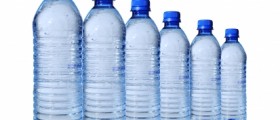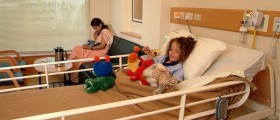
Dehydration
Water is crucial element in human body and insufficient intake of water leads to numerous problems and malfunctions. 75% of body's weight is actually water. The majority of that percentage is situated in the cells and the rest is in the extracellular space. Dehydration is a consequence of inadequate intake of water or increased loss of water.
Dehydration in Children
Most parents start to worry and think about possible dehydration only when their child is suffering from some illness. This particularly occurs if a child vomits or has diarrhea. But they should also pay close attention and prevent dehydration even if there is no disease involved. Namely, hot summer days and inappropriate intake of water may also be responsible for the occurrence of dehydration. In mild cases parents can compensate for the loss of water by increasing the intake of fluids. In severe cases, they are supposed to take the child to doctor. Vomiting is one of the leading causes of dehydration in children. Many parents make mistake and try to compensate for the loss of water by forcing their child to drink too much water too quickly. This can only make the situation worse. They should be more careful and know that even small amounts of water taken in pauses may be more beneficial than forcing a child to drink as much as he/ she can.
While examining the sick child pediatricians examine the amount of weight loss which correlates with the degree of dehydration, the amount of the excreted urine, moisture of mouth and tongue and signs of sunken eyes, and they examine skin turgor of the child to see whether the skin is elastic enough and has appropriate amount of water to turn into the normal position.
Symptoms of Mild Dehydration in Children
Symptoms of mild dehydration include normal thirst or refusal to take certain fluids, preserved moist of mouth and tongue, slightly decrease of urine output, and less than 3 % of weight loss. Heart rate and breathing are normal and extremities are warm. In children eyes are not sunken and there is no sign of sunken fontanel in babies.
Symptoms of Mild to Moderate Dehydration in Children
Progression of dehydration causes tiredness, restless and irritability. The child is very thirsty and his/ her mouth and tongue are obviously dry. The output of urine is significantly reduced. Loss of weight accounts for 3-9%. Heart rate and breathing can be normal or slightly increased. Extremities become cool. Turgor test lasts less than 2 seconds and eyes and/ or fontanel are slightly sunken.
Symptoms of Severe Dehydration in Children
Severe dehydration requires prompt medical help and instant compensation for the loss of fluid. Children suffering from severe dehydration are lethargic and may lose consciousness. They are most commonly unable to drink or can drink very little. The mouth and tongue are parched. Urine output is minimal and the entire weight loss is 9% or more. The heart rate is increased, pulse is weak and the breathing is deep. The extremities are mottled and cold. Turgor test lasts more than 2 seconds. And finally, eyes are deeply sunken and this also refers to fontanel in babies.




-And-Children-16-Warning-Signs-And-Symptoms_f_280x120.jpg)
_f_280x120.jpg)











Your thoughts on this
Loading...